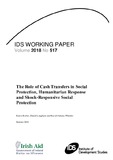The Role of Cash Transfers in Social Protection, Humanitarian Response and Shock-Responsive Social Protection
| dc.contributor.author | Roelen, Keetie | |
| dc.contributor.author | Longhurst, Daniel | |
| dc.contributor.author | Sabates-Wheeler, Rachel | |
| dc.date.accessioned | 2018-10-05T09:19:38Z | |
| dc.date.available | 2018-10-05T09:19:38Z | |
| dc.date.issued | 2018-10 | |
| dc.identifier.citation | Roelen, K.; Longhurst, D. and Sabates-Wheeler, R. (2018) The Role of Cash Transfers in Social Protection, Humanitarian Response and Shock-Responsive Social Protection, IDS Working Paper 517, Brighton: IDS | en |
| dc.identifier.isbn | 978-1-78118-486-8 | |
| dc.identifier.issn | 2040-0209 | |
| dc.identifier.uri | https://opendocs.ids.ac.uk/opendocs/handle/20.500.12413/14081 | |
| dc.description.abstract | Cash transfers have expanded rapidly in low- and middle-income countries (LMICs) around the world in the past decade. The contexts in which they are implemented have also diversified; while cash transfers were mostly adopted initially as central elements of social protection systems, they have become increasingly popular as a core component of humanitarian response. They also play a crucial role in emerging systems of ‘shock-responsive social protection’ (SRSP), which denotes systems that have the ability to scale assistance up and down following a shock – either by increasing the level of assistance for existing beneficiaries or by expanding coverage temporarily to non-beneficiaries affected by the shock. This paper provides an overview of the use of cash transfers in three different settings, namely: (1) cash transfers as long-term support within social protection systems; (2) cash transfers as immediate and short-term support as part of humanitarian assistance; and (3) cash transfers as a key component in scaling up social protection provision and coverage in the event of large-scale emergencies, or smaller-scale, household- and community-level shocks – also referred to as SRSP. Within each of these settings, the paper provides an overview of objectives, modality options, targeting mechanisms, delivery options and main international players promoting or supporting cash transfers. The paper also offers reflection on the efforts to harmonise cash transfers across the social protection and humanitarian spheres within the remit of SRSP. | en |
| dc.description.sponsorship | Irish Aid | en |
| dc.language.iso | en | en |
| dc.publisher | IDS | en |
| dc.relation.ispartofseries | IDS Working Paper;517 | |
| dc.rights | This is an Open Access paper distributed under the terms of the Creative Commons Attribution Non Commercial 4.0 International licence (CC BY-NC), which permits use, distribution and reproduction in any medium, provided the original authors and source are credited, any modifications or adaptations are indicated, and the work is not used for commercial purposes. http://creativecommons.org/licenses/by-nc/4.0/legalcode | en |
| dc.rights.uri | http://creativecommons.org/licenses/by-nc/4.0/ | en |
| dc.subject | Social Protection | en |
| dc.title | The Role of Cash Transfers in Social Protection, Humanitarian Response and Shock-Responsive Social Protection | en |
| dc.type | IDS Working Paper | en |
| dc.rights.holder | IDS | en |
| dc.identifier.team | Rural Futures | en |
| rioxxterms.funder | Default funder | en |
| rioxxterms.identifier.project | Default project | en |
| rioxxterms.version | VoR | en |
| rioxxterms.funder.project | 9ce4e4dc-26e9-4d78-96e9-15e4dcac0642 | en |
Files in this item
This item appears in the following Collection(s)
-
IDS Research [1671]
Except where otherwise noted, this item's license is described as This is an Open Access paper distributed under the terms of the Creative Commons Attribution Non Commercial 4.0 International licence (CC BY-NC), which permits use, distribution and reproduction in any medium, provided the original authors and source are credited, any modifications or adaptations are indicated, and the work is not used for commercial purposes. http://creativecommons.org/licenses/by-nc/4.0/legalcode


